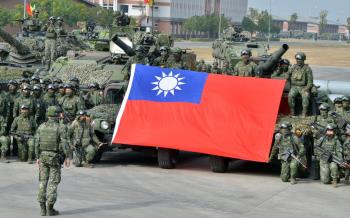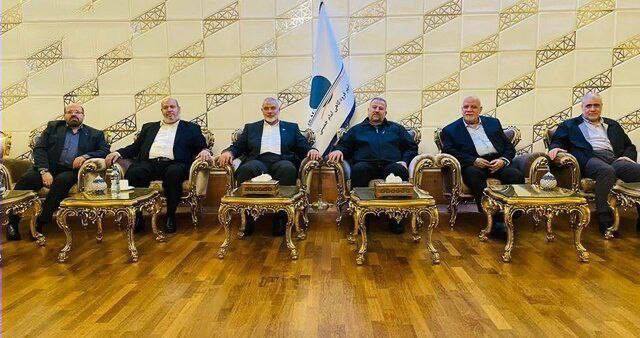Alwaght- While the conditions in the occupied territories, especially the West Bank are highly inflamed and clashes are ongoing between the Palestinian fighters and the Israeli forces and settlers, leaders of Palestinian resistance groups have gathered in Tehran to show that they are ready for any scenario and once again show off to the enemy their strategic and interconnected alliance.
The Hamas leaders have visited Tehran after trips to Saudi Arabia and Egypt to discuss with the Iranian officials latest Palestinian field and political developments. Led by Ismail Haniyeh, the Palestinian delegation arrived in Tehran on Monday. Hamas leader was accompanied by Saleh al-Arouri, Khalil al-Hayya, and Nidhar Awadallah.
The Palestinian media did not mention the details of the Hamas delegation's trip and only suggested that they were to meet and discuss with the Iranian officials the political and field conditions in occupied Palestine.
The trip of the Hamas delegation comes at a time when Ziyad al-Nakhalah, the Secretary General of Islamic Jihad, and his accompanying delegation are also in Tehran. The simultaneity of the trips of the leaders of these two groups to various countries in recent months shows that a kind of cooperation between the Palestinians against their Israeli enemy has formed, and as the leaders of Hamas said in the recent conflict between Islamic Jihad and the Israeli army the rocket attacks on the occupied territories were carried out by the decision of the joint resistance operation command.
On Monday, the senior members of Islamic Jihad met with Iran's President Seyyed Ibrahim Raisi. Raisi said in this meeting: "Once upon a time, the hope of part of the Palestinians was the negotiating table to get rid of the oppression and occupation, but today, everyone, even the supporters of the negotiations, set their hopes on the resistance fighters, and this is the fulfillment of God's promise that the order of creation is not compatible with cruelty and evil. Today, the Palestinian fighters are taking the initiative and this great victory is a divine gift that has been given to the glorious Palestinian nation thanks to patience in the face of problems and standing up against the oppression of the Israeli regime and its backers.”
Noting that the Palestinian nation is now more united than ever and on the opposite side the Israeli society is broken and scattered and showing signs of decline, President Raisi said: “Today, the hearts of the people of the world, from the nations of the region to the people of Latin American countries, are with you, and this is the grace of God and the blessing of the blood of the martyrs of the resistance, including the martyr General Qassem Soleimani, that eliminates ignorance from the world. The final victory is very close and belongs to the glorious nation of Palestine.”
Holding that Palestinian people appreciate the unceasing supports of the Islamic Republic, al-Nakhalah said: “Today, the Islamic Republic of Iran is an important and decisive country in regional and international equations, and your excellency's recent trip to Latin America showed that you managed to completely beat the American sanctions, and we are also proud of these victories.”
Arming of the West Bank a nightmare to Israelis
Amid escalated tensions between Gaza and West Bank-based Palestinian resistance and Tel Aviv, the visit to Tehran of the resistance leaders is examinable from a set of aspects. It is obvious to all that over the past four decades, Iran has been the biggest backer of the Palestinian nation and supported the resistance groups against the Israeli occupation in a variety of ways. The resistance leaders have repeatedly admitted that Iran, especially General Soleimani, was the party to initiate arming Palestinian resistance factions.
It is noteworthy that in recent weeks Israeli Prime Minister Benjamin Netanyahu upped the ante against Iran and, as ever, threatened military action against its nuclear sites. Therefore, the Palestinian officials’ visits are a warning to the Israeli enemy, telling it that Tehran has multiple options to deal blows to its interests.
The resistance leaders’ visit comes at a time the West Bank conditions are at a boiling point and a new war is likely any moment, and as the Israeli media have reported, the army and the Israeli security forces are preparing for a large-scale operation in the West Bank to obliterate the resistance groups. In response to these movements, the "Arin Al-Usud (Lions’ Den) resistance group also issued an order to its fighters to be on high alert and warned that it will give a decisive response to the occupiers.
Hassan Hanizadeh, a West Asia affairs expert, commented on the goals of the Tehran visit of Palestinian leaders, saying that it shows that the situation in the occupied territories is quite critical due to the brutal attacks of the Israeli army in the West Bank and Gaza, and this has caused the Palestinian resistance heads to travel to Tehran to consult with the officials of the Islamic Republic. During the meetings, the senior officials stressed the need to support the Palestinian people against Israeli attacks. It seems that due to the developments the region has seen and the developing convergence between Iran and Saudi Arabia, the atmosphere is completely ready for the formation of broader resistance complex against Tel Aviv, and the leaders of the Palestinian groups are seeking dialogue with some regional figures to this end. Therefore, appropriate measures are likely to be taken in the future to block Israeli aggression against the Palestinians.
Asked about the influence of the talks in Tehran on arming the West Bank, Mr Hanizadeh maintained: “Arming of the West Bank is a strategic measure and this region was previously outside the fighting circle and only Gaza bore the burden of confronting the occupiers, but now given the mental and physical readiness of the West Bank people to confront the Israeli regime, it seems that a broad front has formed from the West Bank to Gaza for a serious confrontation with the enemy. Currently, the residents of the West Bank are standing against Israel along with Gaza, and arming the fighters of this region can be considered a strategic measure to force down the Israeli army's attacks in the occupied territories.
Resistance groups in the West Bank, which are also supported by Gaza, have become a nightmare for Tel Aviv officials these days. The arming of the West Bank was proposed for the first time by Iran's Supreme Leader Seyyed Ali Khamenei and the experience of the last year and the large volume of anti-Israeli operations by Palestinian fighters against the settlers, which has so far killed more than 50 Israelis, have made Tel Aviv concerned about repeat of the experience of southern Lebanon where Israeli forces could not hold the region under their occupation. Driven by this concern, the Israeli National Security Minister Itamar Ben-Gvir, who is the top enemy of the Palestinians, in recent months has taken provocative measures, including storming the holy Al-Aqsa Mosque, to provoke the Palestinians and pave the way for a massive operation of massacring the Palestinians in the West Bank.
The Israelis are largely afraid of arming of the West Bank and are trying to prevent the resistance groups from gaining power in this region, but they have not been successful so far. Even Israeli media have recently warned that the West Bank has become a second Gaza and in case of conflicts in the future, the conditions will be difficult for the occupied territories. Tel Aviv leaders have admitted that in the event of a conflict, they will be targeted from two fronts, and they do not have the ability to fight on multiple fronts. This is why they have lost the initiative to the Palestinian groups.
Israeli leaders are afraid of convergence of the Palestinian groups with Iran and other resistance branches in the region, and they have repeatedly admitted this issue. Netanyahu recently claimed that 90 percent of Israel's security challenges come from Iran, and without a doubt, the presence of Palestinians in Tehran will worry the Zionists even more.
From another aspect, the visit to Tehran comes as Iran and Saudi Arabia have recently reconciled and restored diplomatic ties, and consequently, the Saudis improved relations with Hamas after nearly two decades, and Haniyeh led a high-ranking delegation to Riyadh. It seems that Saudi Arabia and Iran have reached some sort of agreement about empowering the Palestinians against Tel Aviv as the arrival of Palestinian delegations coincided with visit to Tehran of Saudi Foreign Minister Faisal bin Farhan.
In bin Farhan’s meeting with his Iranian counterpart Hussein Amir-Abdollahian, support for Palestinian was raised as a central and linking point in the Muslim world. It is noteworthy that after Tehran-Riyadh détente agreement in March, the kingdom released a number of Hamas prisoners in its prisons including Mohammad Khedhri, a prominent figure of the movement, signaling that even the Saudis have reviewed their approach to the Palestinian resistance groups.



























